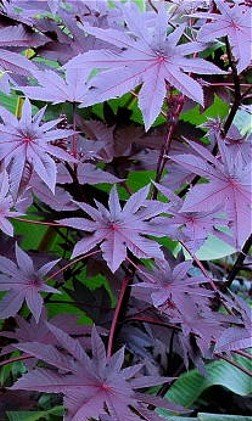 Plants grow up to 12 feet tall.
Plants grow up to 12 feet tall.
I never knew a Castor Bean plant could grow this tall.
The plant has many uses besides producing Ricen. The castor bean plant yields high-quality oil suitable for plastics manufacture, cosmetics, polyurethanes, synthetic detergent, inks, lacquers, paint strippers and varnishes. Conditions for Growing Castor Beans. In fact, these are beans we're planting in the garden to help repel pests. Ricin Toxin from Castor Bean Plant, Ricinus communis Ricin is one of the most poisonous naturally occuring substances known. Many of our gardening friends tell us they use the Castor Bean to help repel moles. As you can see from the photo, we don't have any fear of touching castor beans. Ricin in the seeds and leaves is seven times more deadly than cobra venom, according to USDA experts. EARLY last summer, at an herb festival in Maryland, I stumbled on a four-inch castor bean plant. It's theoretically possible to poison yourself with castor beans, but it is a lot harder than most people seem to think. Beans. Castor oil is needed to produce nylon and other fabrics. It is in the same family as Christmas Poinsettias (euphorbia) Castor beans also seem to do a decent job of repelling groundhogs. You can order also on line. I hope this pic is good enought for you to tell. The seeds from the castor bean plant, Ricinus communis, are poisonous to people, animals and insects.One of the main toxic proteins is "ricin", named by Stillmark in 1888 when he tested the beans' extract on red blood cells and saw them agglutinate. Ricinus communis dies at the first sign of frost but in the southern states, Mexico and beyond the plant tends to naturalize easily and sometimes even become a invasive nuisance. Castor bean seeds are widely available online. Castor Beans may become a weed in some areas! It is available in the UK as a seed or a plant in garden centres, in New Zealand I saw a couple of plants growing by the roadside. Amazing, giant leaves make Castor Bean an attractive alternative for screening. The seeds of the castor bean plant contain ricin, a potent poison with no known antidote. It is also possible to grow castor oil plant in coastal areas. Ricinus communis var. Not a perfect or excellent job though. It is well-known that castor beans (the seeds of the castor plant) are toxic. It is available in the UK as a seed or a plant in garden centres, in New Zealand I saw a couple of plants growing by the roadside.
© Copyright - Radically Human - Wordpress Premium Theme by Kriesi